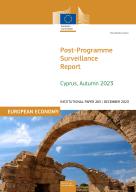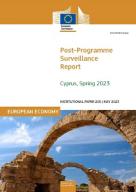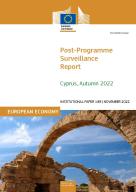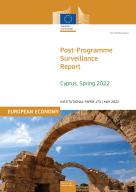Post-programme surveillance
The economic adjustment programme for Cyprus was formally agreed in May 2013. In March 2016, Cyprus exited its 3-year economic adjustment programme, which included an ambitious reform agenda and contributed to ensuring financial stability, improving public finances and restoring sustainable economic growth.
Cyprus is now subject to post-programme surveillance (PPS) until at least 75% of the financial assistance received has been repaid. If no early repayments are made, PPS may last at least until 2029. The objective of PPS is to measure Cyprus's capacity to repay its outstanding loans to the European Stability Mechanism (ESM).
Under PPS, the European Commission and European Central Bank will
- regularly assess Cyprus' economic, fiscal and financial situation
- prepare semi-annual assessments of Cyprus's economic, fiscal and financial situation and determine whether corrective measures are needed
Economic adjustment programme for Cyprus
Following a request by Cyprus on 25 June 2012, the European Commission, the European Central Bank (ECB) and the International Monetary Fund (IMF) agreed an economic adjustment programme with the Cypriot authorities on 2 April 2013. The programme was agreed by euro area countries on 24 April 2013 and by the IMF Board on 15 May 2013. It covered the period 2013-16. The financial package covered up to €10 billion with the ESM providing up to €9 billion, and the IMF contributing around €1 billion.
Objectives of the economic adjustment programme
The economic adjustment programme addressed short- and medium-term financial, fiscal and structural challenges faced by Cyprus. The key objectives were to
- restore the soundness of the Cypriot banking sector and rebuild depositors' and market confidence by thoroughly restructuring financial institutions, strengthening supervision and addressing expected capital shortfalls, in line with the political agreement of the Eurogroup of 25 March 2013
- continue the fiscal consolidation process to correct the excessive government deficit through measures to reduce current primary expenditure, and maintain fiscal consolidation in the medium-term, in particular through measures to
- increase the efficiency of public spending within a medium-term budgetary framework
- enhance revenue collection
- improve the functioning of the public sector
- implement structural reforms to support competitiveness and sustainable and balanced growth, allowing for the ending of macroeconomic imbalances, in particular by reforming the wage indexation system and removing obstacles to the smooth functioning of services markets
ESM disbursements
An overview of loan disbursements by the European Stability Mechanism (ESM) to Cyprus is available on the ESM website.
Support Group for Cyprus
By mobilising EU funds and technical expertise, the Support Group for Cyprus (SGCY) supported the Cypriot authorities’ efforts to restore financial, economic and social stability and to implement the memorandum of understanding (MoU) on specific economic policy conditionality.
As of 1 July 2015, the SGCY, together with the Task Force for Greece (TFGR), became part of the newly created Structural Reform Support Service (SRSS), housed in the Secretariat-General of the European Commission. The SRSS provides technical assistance in implementing growth-enhancing administrative and structural reforms to all EU countries that request. The SRSS is headed by Director-General Maarten Verwey.
Reports

- Report
- Directorate-General for Economic and Financial Affairs
This report by the European Commission presents the findings of the fifteenth post-programme surveillance mission to Cyprus and identifies remaining challenges for the Cypriot economy.

- Report
- Directorate-General for Economic and Financial Affairs
This report by the European Commission presents the findings of the 14th post-programme surveillance mission to Cyprus and identifies remaining challenges.

- Report
- Directorate-General for Economic and Financial Affairs
This report by the European Commission presents the findings of the 13th post-programme surveillance mission to Cyprus and identifies remaining challenges.

- Report
- Directorate-General for Economic and Financial Affairs
This report by the European Commission presents the findings of the 12th post-programme surveillance mission to Cyprus and identifies the remaining challenges.

- Report
- Directorate-General for Economic and Financial Affairs
This report by the European Commission presents the findings of the 11th post-programme surveillance mission to Cyprus and identifies remaining challenges.
Archive
The Economic Adjustment Programme for Cyprus – Fifth Review - Summer 2014
The Economic Adjustment Programme for Cyprus – Fourth Review - Spring 2014
The Economic Adjustment Programme for Cyprus – Third Review - Winter 2014
The Economic Adjustment Programme for Cyprus – Second Review - Autumn 2013
The Economic Adjustment Programme for Cyprus – First Review - Summer 2013
